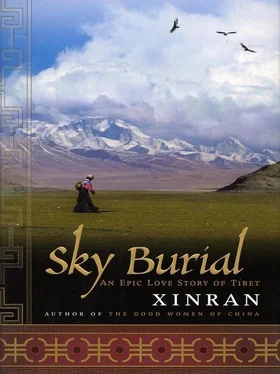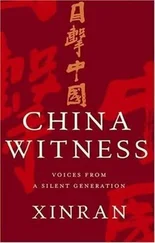Suddenly, Wen saw Pad standing in a trance at the tent door, staring into the distance. When Saierbao called out to her to come and help with the butter, she didn’t move. Even more strangely, she then walked twice around the tent. Although Saierbao seemed unperturbed by her daughter’s behavior, Wen was puzzled. She walked over to the tent door and saw, in the distance, Ni and Hum running toward them. There was no sign of Zhuoma.
When the children finally reached the tent, they were in tears. Wen watched Saierbao turn pale as she listened to what they were telling her and then run out of the tent to wave and shout at the far-off figures of Gela, Ge’er, and Om. Wen waited anxiously for the men to arrive back at the tent so that she could find out what had happened. All she could understand from the children’s babbling was the word “Zhuoma” repeated over and over again.
After what seemed like hours, the men entered the tent and listened to what the children had to say. Wen implored them in gestures to explain to her what was being said. It was Ge’er who, as so often, seemed to understand her. Taking a board that was usually used for working sheepskin, he threw some barley flour over it and drew a few pictures with his finger. Although crude, the pictures were clear enough. A group of men on horseback had thrown a sack over Zhuoma’s head and carried her off. When Wen had recovered from her initial shock, she laboriously asked Ni if she had seen anything else. Ni pulled down the sleeve of her robe to reveal several long scratches on her right shoulder. Hum placed Wen’s hand on his head, where she felt a large bump. She guessed they must have been hurt struggling with whoever had kidnapped Zhuoma. Wen had no idea why anyone would have wanted to take her. It was inconceivable. Unless they were some unknown enemies of Zhuoma’s, or Chinese soldiers.
For the rest of the day, Wen asked Ni and Hum many questions using gestures, pictures, and objects in an attempt to find out some more details about what had happened. It seemed that while Zhouma and the children were on their way home with the water, the group of men had ridden up to them, lassoed Zhuoma as they would a horse, and bundled her into a large cloth sack-the kind used to carry offerings. The children could understand what the men had been saying, so they must have been Tibetans. Two of them, it appeared, were the men who had visited their tent the day before. Ni told Wen that Zhuoma had continued to struggle, even after she’d been flung over the horse’s back. Wen remembered Pad’s strange behavior on the morning of the kidnapping. Had she seen or sensed something? She tried to ask her if she knew where Zhuoma was now, but Pad simply shook her head and pointed to her mouth, not saying a word. Wen had no idea what she meant.
In the days that followed, Gela and Ge’er spent hours scouring the surrounding land on horseback, looking for a sign of Zhuoma and her kidnappers, but they had melted into thin air. Each evening the men would return disconsolate. When they caught her eye, Wen understood that they had no hope of finding Zhuoma, and that they pitied Wen, who now found herself completely alone and unable to communicate.
AS SUMMER turned to autumn, Wen entered the darkest period of her life. At night, she would weep for the woman whose sleeping space now lay empty at her side, remembering her courage and intelligence. During the day, she struggled to manage without Zhuoma as an interpreter. The odd sentence of Tibetan that Zhuoma had managed to teach her-a few verbs and words like “yes” and “no”-allowed her to go about her daily tasks, but outside these routines, she was confined to a world of silence. And she had little hope of learning more Tibetan. Gela’s family lived their lives in a kind of tacit understanding. Even when they had the time to talk to each other, it was rare to hear them in conversation. Without language, how would she ever be able to persuade them to help her leave their home and risk her life alone on the plateau? Aside from the fact that she had his photograph, the family knew nothing of Kejun. Zhuoma had advised her not to tell them that the Chinese army was in Tibet. They would not understand why and it would frighten them.
Would she ever be able to tell them that she loved her husband so much she was prepared to suffer anything to find him?
Wen was eaten up by pain and disappointment. It was as if she had drawn close to her husband only to see him disappear yet again. She was trapped and could see no way out.
AFTER ZHUOMA’S disappearance, the family seemed far more fearful. Ni’s merry laughter dried up and the usually irrepressible Hum now clung silently to his mother instead of prancing and skipping around the tent. When the time came to move to their next pasture, Gela seemed to choose an even more remote place to settle. If they saw a human form in the distance, Gela would signal to his family to keep out of sight. Once or twice, he even hid Wen among the sheep so that she couldn’t be seen by passing travelers, as if he was worried that she too might be carried off. It felt like they were leaving the world of men far behind them.
Wen began to keep a diary. Every day she would use one of her colored stones to write a few lines on one of the pages of The Collected Essays of Liang Shiqiu.
The stones left only a faint indentation. She had to condense and limit her writing in order to save paper. Nevertheless, the diary was her only means of recording her thoughts and retaining her ability to write Chinese. It gave her a new strength and determination to survive.
ONE MORNING, Ni fainted as she was helping Saierbao with the milking. Saierbao yelled out to her husbands for help, and Gela carried Ni back to the tent. Clearly troubled, Gela said something to Ge’er, who immediately left the tent and began to saddle his horse. Gela then mumbled a few words to Saierbao, who went over to the stove and put some water on to boil. Using all the Tibetan she had learned, Wen tried to tell Saierbao that she was a menba, that she might be able to help them, but Saierbao looked at her blankly and continued what she was doing. Suddenly, Hum cried out, pointing at Ni’s lower body. Everyone’s eyes followed his pointing finger: blood was seeping through Ni’s robe. Gela told Pad to take Hum outside, then gestured at Wen to help him open Ni’s clothing. On the garments under her robe they found layer upon layer of bloodstains.
Now Wen finally understood why Ni had been weeping every night: she must have been bleeding like this for ages. She remembered Zhuoma telling her that because fetching water was so backbreaking, the women were very skilled at saving on clothes washing and went to great lengths to avoid menstrual bloodstains. Ni’s bleeding could not therefore be simply an ordinary period.
Trying to hold back her tears, Saierbao gestured to Wen that they had all known about this problem for a long time, but didn’t know what to do.
Gela soaked a piece of felt in hot water, wrung it dry, spat a couple of mouthfuls of barley wine onto it, wrung it out again, and walked over to the statue of Buddha to pray. He then wrapped the piece of felt around Ni’s feet and spat another mouthful of barley wine over her forehead. Ni’s lips moved slightly and her eyes opened a crack. She looked toward her mother, who was turning her prayer wheel and praying in front of the altar. Gela called Saierbao over and placed their daughter’s hand in hers. Ni gave a faint smile, then closed her eyes.
Wen stepped forward and took her pulse. It was terribly weak and she was continuing to lose blood. Yet without medical equipment or medicine, there was nothing Wen could do to help her. She was torn apart by guilt and frustration.
Throughout the day, the whole family kept a silent vigil by Ni’s side; even Hum-so hungry that he was sucking his fingers-remained totally quiet. Saierbao and Gela knelt together in front of the Buddha, endlessly turning the prayer wheel while they prayed.
Читать дальше












